Advertisements
Advertisements
Question
Using the adjacent Venn diagram, find the following set:
A’ ∪ B’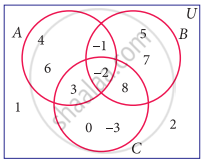
Solution
From the diagram we get
U = {−3, −2, −1, 0, 1, 2, 3, 4, 5, 6, 7, 8},
A = {−2, −1, 3, 4, 6}
B = {−2,−1, 5, 7, 8}
C = {−3, −2, 0, 3, 8}
A’ = U – A
= {−3, −2, −1, 0, 1, 2, 3, 4, 5, 6, 7, 8} – {– 2, – 1, 3, 4, 6}
= {– 3, 0, 1, 2, 5, 7, 8}
B’ = U – B
= {– 3, – 2, – 1, 0, 1, 2, 3, 4, 5, 6, 7, 8} – {– 2, – 1, 5, 7, 8}
= {– 3, 0, 1, 2, 3, 4, 6}
B ∪ C = {– 2, – 1, 5, 7, 8} ∪ {– 3, – 2, 0, 3, 8}
= {– 3, – 2, – 1, 0, 3, 5, 7, 8}
B ∩ C = {– 2, – 1, 5, 7, 8} ∩ {– 3, – 2, 0, 3, 8}
= {– 2, 8}
A’ ∪ B’ = {– 3, 0, 1, 2, 5, 7, 8} ∪ {– 3, 0, 1, 2, 3, 4, 6}
= {– 3, 0, 1, 2, 3, 4, 5, 6, 7, 8}
APPEARS IN
RELATED QUESTIONS
Using the adjacent Venn diagram, find the following set:
A – B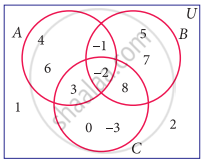
Using the adjacent Venn diagram, find the following set:
(B ∪ C)’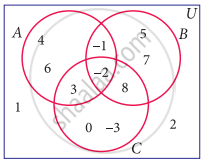
Using the adjacent Venn diagram, find the following set:
A – (B ∪ C)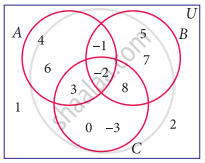
Using the adjacent Venn diagram, find the following set:
A – (B ∩ C)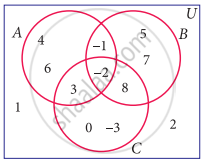
If K = {a, b, d, e, f}, L = {b, c, d, g} and M = {a, b, c, d, h} then find the following:
K ∪ (L ∩ M)
If K = {a, b, d, e, f}, L = {b, c, d, g} and M = {a, b, c, d, h} then find the following:
(K ∩ L) ∪ (K ∩ M) and verify distributive laws
If A = {x : x ∈ Z, −2 < x ≤ 4}, B = {x : x ∈ W, x ≤ 5}, C = {− 4, −1, 0, 2, 3, 4} verify A ∪ (B ∩ C) = (A ∪ B) ∩ (A ∪ C)
Verify A ∪ (B ∩ C) = (A ∪ B) ∩ (A ∪ C) using Venn diagrams
If A = {b, c, e, g, h}, B = {a, c, d, g, i}, and C = {a, d, e, g, h}, then show that A – (B ∩ C) = (A – B) ∪ (A – C)
If A = {x : x = 6n, n ∈ W and n < 6}, B = {x : x = 2n, n ∈ N and 2 < n ≤ 9} and C = {x : x = 3n, n ∈ N and 4 ≤ n < 10}, then show that A – (B ∩ C) = (A – B) ∪ (A – C)
